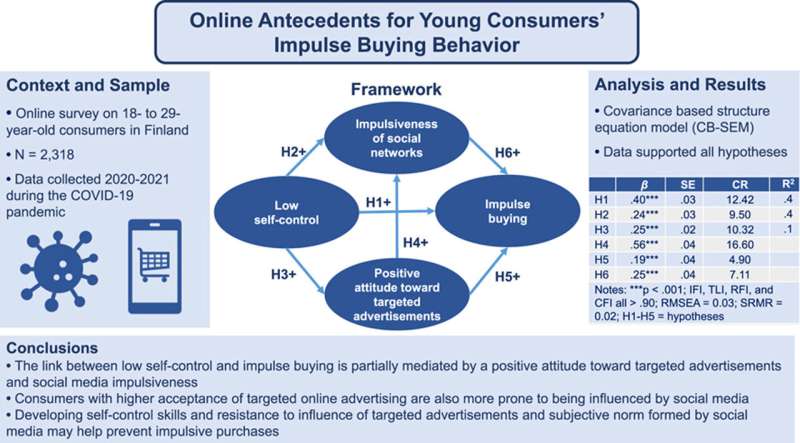This article has been reviewed according to Science X's editorial process and policies. Editors have highlighted the following attributes while ensuring the content's credibility:
fact-checked
peer-reviewed publication
trusted source
proofread
Weak self-control, social media and targeted advertising increase impulse buying, says study

Online shopping and digital payment options have made shopping easier and more enjoyable—money can be spent almost unnoticeably. These factors predispose people to impulse purchases. A lack of budgeting and cost control may lead a consumer into financial problems.
Product returns cause costs the companies as well. Moreover, the waste and carbon footprint resulting from unnecessary consumption and the logistics of online shopping burden the environment.
A survey conducted by the Department of Social Sciences and Philosophy at the University of Jyväskylä investigated the buying behavior of and attitudes towards marketing in digital environments of Finnish people between the ages of 18 and 29. The study sample included 2,318 respondents, and it was representative of the population of young adults in Finland. The study is published in Computers in Human Behavior.
It is known that impulse purchases are a consequence of poor self-control. The survey results indicated that low self-control leads to impulse buying influenced by social media and targeted advertising. Especially those consumers who have poor self-control find social media networks and targeted advertisements as good support for their buying decisions.
"Data are collected on consumers' online activities and use of digital devices, and on this basis, advertisements are then targeted to them," says Postdoctoral Researcher Jussi Nyrhinen. For this reason, the content or context of advertisements appear as meaningful for the consumers. In social media, commercial content is enticing because it is connected not only to public figures, but also to the consumers' social contacts.
Self-control is a personal characteristic which is hard to influence. Instead, according to Nyrhinen, we can seek to prevent impulse buying by decreasing the influence of social media and targeted advertising. The use of digital devices at school should not be restricted, but students should be taught to apply media and financial literacy in digital environments.
The responsibility for problems related to targeted advertising and marketing in social media also belongs to the marketers and technology companies. However, competition drives marketers to target their advertising more and more effectively, and social media platforms seek to get their users more deeply engaged while also increasing sales. We can attempt to respond to these challenges by developing legislation and educating consumers.
More information: Jussi Nyrhinen et al, Online antecedents for young consumers' impulse buying behavior, Computers in Human Behavior (2023). DOI: 10.1016/j.chb.2023.108129
Journal information: Computers in Human Behavior
Provided by University of Jyväskylä





















